- Home
- Jack London
Martin Eden Page 2
Martin Eden Read online
Page 2
Set against the theme of the sea is Moloch, the machine that eats up men and women, hope and vitality, youth and age. It is the machines of the cannery that roughen Lizzie Connolly’s hands and make her, in his eyes, unfit for Martin Eden’s love; Ruth’s hands are soft, for she has never had to work and so is superior in culture. The magazine editors seem to run a machine that takes in manuscripts, puts them through cogs, inserts a rejection slip, and spits them out. When Martin is forced to work in a laundry with Joe, the washing machines make of him an intelligent machine, a rapidly exhausted machine, a machine that will wear out and be discarded. “Fancy starch” is the nightmare that machines make of Martin’s romantic love—and the seventy miles to Oakland that Martin has to cover on his mechanical wheels. When he sets up a simple laundry machine for Maria Silva, he loses his status in her eyes; he is a manual worker, not a writer. In his fever soon afterward, he confuses the laundry and the literary machine, so that Joe starches manuscripts, while he mangles checks in the wringer. His ancient typewriter, his Blickensdorfer, is a necessity if his writing is to be read and accepted; when it is pawned, he cannot write. And lastly, when he beats the literary machine and makes a fortune, he sets up Maria in a dairy, Joe in a laundry, his brothers-in-law in commerce, so that they can make ordinary lives out of their automatic existences, while Martin, weary of work performed, goes down to the sea to rest forever.
The chief quality of the novel lies in London’s recapturing of his relentless toil to gain literary fame. London first wanted to call the book Success, or Star-dust; he knew the lure of fame for him and Martin Eden. He often used to belittle his own artistry and skill with words, presenting himself as a blacksmith of literature rather than a wordsmith of style and grace. “Don’t loaf and invite inspiration,” he advised the aspiring writer, “light out after it with a club, and if you don’t get it you will nonetheless get something that looks remarkably like it.” The secret was to work all the time. Martin Eden’s obsessive and incessant concentration has inspired tens of thousands of young writers, even if few of them have won the recognition that Eden both desired and rejected.
The secondary quality of the novel lies in London’s awareness of the difficulty of changing social classes. Martin Eden (a Biblical name suggesting struggle and innocence) adores Ruth (another Biblical name, suggesting love and waiting) and is adored by Lizzie. He should love Lizzie, who comes from his own class, and make her happy, but by the time he has become acceptable to Ruth’s class, he despises it, yet cannot return to Lizzie. If London had dwelt more on the emotional aspects of the hopeless struggle to change classes rather than on the philosophical questions, if he had concentrated on the love triangle rather than on his recollections of the bohemian and radical “Crowd” at San Francisco, the one weakness of the novel would have been avoided. For the long chats about evolution and the superman and socialism have dated. The need to write autobiography overcame London’s talent as a novelist, and his urge to display his hard-won erudition triumphed over his feeling for his characters. To illustrate the class war, another confrontation between Ruth and Lizzie would have been worth more than ten sophomoric debates between Eden and Brissenden and the Oakland socialists.
Brissenden was modeled on George Sterling, the “Greek” who provided the most intense male friendship in London’s life. Sterling was a minor romantic poet who admired and envied London’s profligate vigor and natural genius, and, above all, his international success. Brissenden is an idealized portrait of Sterling, and his manner of speaking provokes the worst writing in the novel, the poet’s mawkish effusions about beauty and corruption. Sterling did tend to write and talk like a man who had swallowed Swinburne whole and Rossetti undigested. “Beauty hurts you,” Brissenden declares to Martin Eden. “It is an everlasting pain in you, a wound that does not heal, a knife of flame. Why should you palter with magazines? Let beauty be your end. Why should you mint beauty into gold?” Such gossamer gallimaufry is as much “Ephemera” as Brissenden’s posthumous masterpiece, but is unfortunately preserved forever in Martin Eden. The thorns in the text that prick the reader are the simple truths, such as Ruth’s perception of poverty as an unpleasant condition of existence, or Lizzie’s piercing comment, “Something’s wrong with your think-machine.”
As Earle Labor has pointed out, Martin Eden is a Bildungsroman, a novel about the necessary education of a young man from a state of ignorance and innocence through the trials of knowledge to a condition of dark awareness. Rousseau and Goethe, Melville and D. H. Lawrence, Thomas Wolfe and Thomas Mann have all written novels in this tradition. As London was a selfmythologizing hero in so much of his writing, many of his fifty books contribute to a continuing Bildungsroman. Martin Eden particularly does so. Part of London’s education was to escape from Sterling and the “Crowd,” a group of self-conscious young writers and artists and debaters who had first met at Coppa’s restaurant in San Francisco and who formed a colony at Carmel, characterized by daily hedonism and occasional suicide, abalone-diving and criticism of all but themselves. Martin Eden grows bored with the “Crowd” and chooses a watery death rather than listen to it. In a later novel, The Valley of the Moon, which eulogizes flight from the city to the land rather than to the sea, London parodies the false Eden of the Carmel colony, where intellectuals played at Thoreau in safe suburban woods. For London, the true Eden lay in the ranch at Glen Ellen.
First published as a book in 1909, Martin Eden was too early for its audience. The myth of individual success through hard work still dominated American culture. Horatio Alger inspired, whereas Jack London depressed. The revolutionary idea that hard work and success were self-defeating in an unlovely mechanical society was unpalatable, both to radicals and to Republicans. London had been liked by the left wing for his socialist views, yet Martin Eden’s ambition seemed an attack on socialism, a glorification of the Nietzschean hero and man on horseback. Although London might protest that the novel was an attack on individualism, not socialism, he had made it so autobiographical that his radical readers could not distinguish him from his leading character. He might be conscious that his socialist sympathies separated him from Martin Eden, but by confusing the facts of his own rise to fame with his hero’s, he risked condemnation as an apostate. There was already a contradiction between his life-style and his political professions. As Mark Twain commented, if Jack London got the kind of society he wanted, he would have to call out the militia to collect his royalties. Many of London’s socialist comrades took Martin Eden to be the testament of the man who had deserted the cause by sailing away on the Snark, and by becoming a rancher. One of them wrote to him, wishing him the same fate as Martin Eden’s: “When you swallow the last mouthful of salt chuck you can hold before sinking, remember that we at least protested.”
To established critics, Martin Eden also seemed a failure. It denigrated capitalism and self-improvement and ambition without providing any alternatives. London had been known for his celebration of man’s struggle for survival, his will to live in the bleakest of conditions. Now, confused with the hero of his book, London seemed to preach futility and deny the elemental and archetypal force of the message in his previous books about nature, the Klondike, and the sea. Martin Eden was universally condemned, and London’s reputation sank, until the publication in 1910 of a vigorous, optimistic Klondike adventure story, Burning Daylight, which did not preach a thing, but entertained. As the reviewer in The Bookman declared, it was a pleasure to see London return to using his power as a storyteller, after passing through “the sad phase of unrest out of which Martin Eden grew—it’s certainly sad to have one’s emotions take such unpleasant forms.”
Ironically, contemporary reviews of Martin Eden confirmed the disgust London felt for readers and reviewers, expressed in this passage about his hero:His intrinsic beauty and power meant nothing to the hundreds of thousands who were acclaiming him and buying his books. He was the fad of the hour, the adventurer who had stormed Parnassus while the gods
nodded. The hundreds of thousands read him and acclaimed him with the same brute non-understanding with which they had flung themselves on Brissenden’s “Ephemera” and torn it to pieces—a wolf-rabble that fawned on him instead of fanging him. Fawn or fang, it was all a matter of chance.
Posterity confirmed London’s disdain. If Martin Eden was a failure at the time because it was before its time, it proved to be the only one of his fifty books that his publishers, Macmillan, kept in print in a cloth edition for seventy years, selling a quarter of a million copies. Against its author’s intention, it appealed to young writers determined to succeed by force of will and dedication, without benefit of innate talent. The novel’s disillusion with bourgeois values suited the iconoclasm of the 1920s and the anticapitalism of the Depression decade of the 1930s. Its uneasy balance between the drive to succeed at all costs and the despair that follows victory seemed truthful. Only the problem of Martin Eden’s suicide—paralleled by the early death of London from excess in 1916—prevented full acceptance and critical acclaim.
In the general reevaluation of London’s work begun by Maxwell Geismar and Franklin Walker, Martin Eden has taken a significant place. Its force and appeal have survived the passage of time; its flaws and unevenness are less relevant. Always popular in France and Italy, Germany and Russia, the novel has been recently adapted into a television series that proved more successful in many European countries than even Roots or Holocaust. (CBS will screen the television series in the United States.) For Jack London was the incessant Californian pilgrim. However great his self-destructiveness, his mind ranged after the infinite possibilities of mankind. If he despaired from time to time, he also sought a new vision on a renewed earth. Martin Eden was his autobiographical novel. His determination and his questings make it live.
—Andrew Sinclair
SUGGESTIONS FOR FURTHER READING
BOOKS BY JACK LONDON
The Abysmal Brute. New York, 1913.
The Acorn Planter. New York, 1916.
Adventure. New York, 1911.
Before Adam. New York, 1907.
Burning Daylight. New York, 1910.
The Call of the Wild. New York, 1903.
Children of the Frost. New York, 1902.
The Cruise of the Dazzler. New York, 1902.
The Cruise of the Snark. New York, 1911.
A Daughter of the Snows. Philadelphia, 1902.
Dutch Courage and Other Stories. New York, 1922.
The Faith of Men. New York, 1904.
The Game. New York, 1905.
The God of His Fathers. New York, 1901.
Hearts of Three. New York, 1920.
The House of Pride and Other Tales of Hawaii. New York, 1912.
The Human Drift. New York, 1917.
The Iron Heel. New York, 1908.
Jerry of the Islands. New York, 1917.
John Barleycorn. New York, 1913.
The Little Lady of the Big House. New York, 1916.
Lost Face. New York, 1910.
Love of Life and Other Stories. New York, 1907.
Martin Eden. New York, 1909.
Michael, Brother of Jerry. New York, 1917.
Moon-Face and Other Stories. New York, 1906.
The Mutiny of the Elsinore. New York, 1914.
The Night-Born. New York, 1913.
On the Makaloa Mat. New York, 1919.
The People of the Abyss. New York, 1903.
The Red One. New York, 1918.
Revolution and Other Essays. New York, 1910.
The Road. New York, 1907.
The Scarlet Plague. New York, 1915.
Scorn of Women. New York, 1906.
The Sea-Wolf. New York, 1904.
Smoke Bellew. New York, 1912.
The Son of the Wolf. Boston, 1900.
A Son of the Sun. New York, 1912.
South Sea Tales. New York, 1911.
The Star Rover. New York, 1915.
The Strength of the Strong. New York, 1914.
Tales of the Fish Patrol. New York, 1905.
Theft: A Play in Four Acts. New York, 1910.
The Turtles of Tasman. New York, 1916.
The Valley of the Moon. New York, 1913.
War of the Classes. New York, 1905.
When God Laughs and Other Stories. New York, 1911.
White Fang. New York, 1906.
BOOKS BY JACK LONDON AND OTHERS
London, Jack, and Strunsky, Anna. The Kempton-Wace Letters. New York, 1903.
London, Jack, completed by Robert L. Fish. The Assassination Bureau, Ltd. New York, 1963.
CRITICISM AND BIOGRAPHY
Bridgwater, P. Nietzsche in Anglosaxony: A Study of Nietzsche’s Impact on English and American Literature. Leicester, 1972.
Brown, D. Soviet Attitudes Toward American Writing. Princeton, N. J., 1962.
Foner, P. S. Jack London: American Rebel. New York, 1947.
Hendricks, K., and Shepard, I., eds. Letters from Jack London. New York, 1965.
Johnson, M. Through the South Seas with Jack London. New York, 1913.
Kingman, R. A Pictorial Life ofJack London. New York, 1979.
Labor, E. Jack London. New York, 1974.
London, C. K. The Book of Jack London, 2 vols. New York, 1921.
London, J. Jack London and His Times: An Unconventional Biography. Seattle, 1968.
Lynn, K. S. The Dream of Success. Boston, 1955.
Ownbey, R. W., ed. Jack London: Essays in Criticism. Layton, Utah, 1978.
Sinclair, A. Jack: A Biography of Jack London. New York, 1977.
Starr, Kevin. Americans and the California Dream, 1850—1915. New York, 1973.
Walcutt, C. C. Jack London. Minneapolis, 1966.
Walker, D. L., ed. The Fiction of Jack London: A Chronological Bibliography. El Paso, Texas, 1972.
Walker, F. Jack London and the Klondike. San Marino, California, 1966.
—————. The Seacoast of Bohemia: An Account of Early Carmel. San Francisco, 1966.
ARTICLES
Calder-Marshall, A. “Introduction.” Martin Eden (The Bodley Head Jack London). 4 vols. London, 1965.
Etulain, R. “The Lives of Jack London.” Western American Literature 11 (1976).
Geismar, M. “Jack London: The Short Cut.” In Rebels and Ancestors: The American Novel, 1890—1915. Boston, 1953.
Pattee, F. L. “The Prophet of the Last Frontier.” In Sidelights on American Literature. New York, 1922.
Shivers, A. S. “The Romantic in Jack London.” Alaska Review 1 (1963).
Walcutt, C. C. “Jack London: Blond Beasts and Supermen.” In American Literary Naturalism: A Divided Stream. Minneapolis, 1956.
Walker, F. “Jack London: Martin Eden.” In The American Novel from James Fenimore Cooper to William Faulkner, edited by W. Stegner. New York, 1965.
A NOTE ON THE TEXT
The text of Martin Eden is that of the first edition of the book, published by The Macmillan Company in 1909. No Collected Edition of the works of Jack London has yet been published, and London himself refused to revise his printed works. Punctuation and spelling have been slightly modernized; the author’s very occasional archaisms and grammatical errors have also been corrected; for example, “bicycle shop” has been substituted for “cyclery” and “wafting” for “wafture.”
Chapter One
The one opened the door with a latch-key and went in, followed by a young fellow who awkwardly removed his cap. He wore rough clothes that smacked of the sea, and he was manifestly out of place in the spacious hall in which he found himself. He did not know what to do with his cap, and was stuffing it into his coat pocket when the other took it from him. The act was done quietly and naturally, and the awkward young fellow appreciated it. “He understands,” was his thought. “He’ll see me through all right.”
He walked at the other’s heels with a swing to his shoulders, and his legs spread unwittingly, as if the level floors were tilting up and sinking down to the heave and lunge of th
e sea. The wide rooms seemed too narrow for his rolling gait, and to himself he was in terror lest his broad shoulders should collide with the doorways or sweep the bric-a-brac from the low mantel. He recoiled from side to side between the various objects and multiplied the hazards that in reality lodged only in his mind. Between a grand piano and a center-table piled high with books was space for a half a dozen to walk abreast, yet he essayed it with trepidation. His heavy arms hung loosely at his sides. He did not know what to do with those arms and hands, and when, to his excited vision, one arm seemed liable to brush against the books on the table, he lurched away like a frightened horse, barely missing the piano stool. He watched the easy walk of the other in front of him, and for the first time realized that his walk was different from that of other men He experienced a momentary pang of shame that he should walk so uncouthly. The sweat burst through the skin of his forehead in tiny beads, and he paused and mopped his bronzed face with his handkerchief.

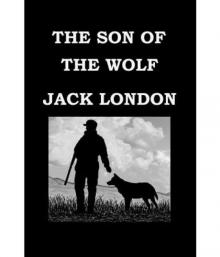 The Son of the Wolf
The Son of the Wolf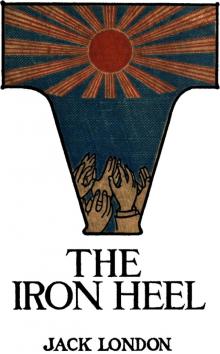 The Iron Heel
The Iron Heel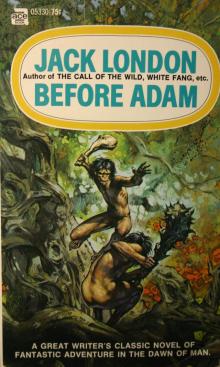 Before Adam
Before Adam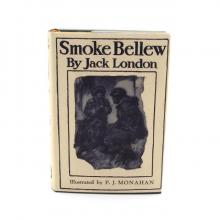 Smoke Bellew
Smoke Bellew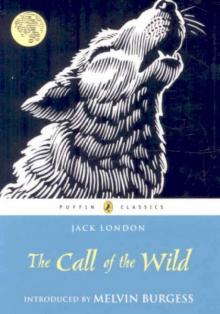 The Call of the Wild
The Call of the Wild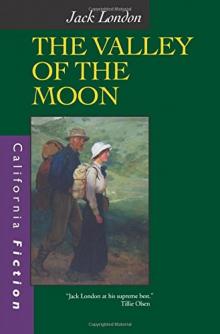 The Valley of the Moon Jack London
The Valley of the Moon Jack London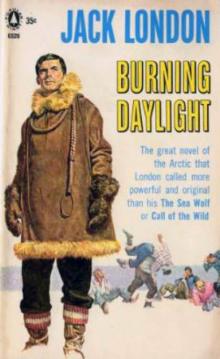 Burning Daylight
Burning Daylight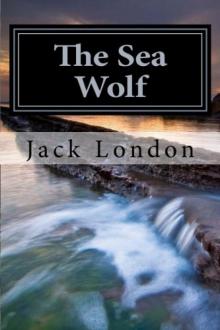 The Sea Wolf
The Sea Wolf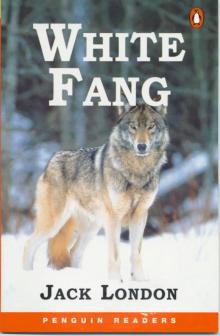 White Fang
White Fang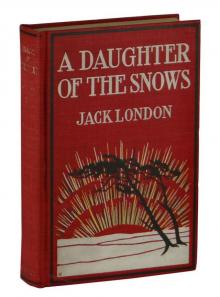 A Daughter of the Snows
A Daughter of the Snows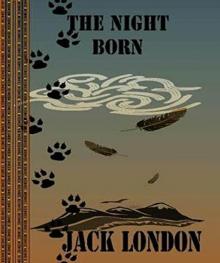 The Night-Born
The Night-Born A Son Of The Sun
A Son Of The Sun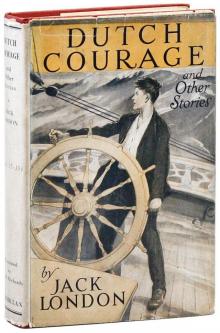 Dutch Courage and Other Stories
Dutch Courage and Other Stories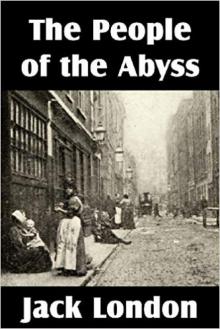 The People of the Abyss
The People of the Abyss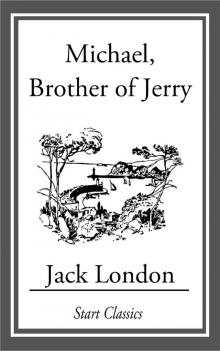 Michael, Brother of Jerry
Michael, Brother of Jerry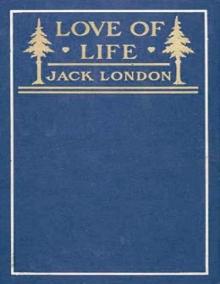 Love of Life, and Other Stories
Love of Life, and Other Stories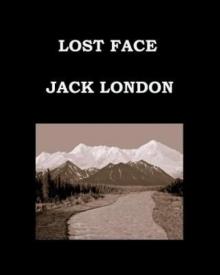 Lost Face
Lost Face The Road
The Road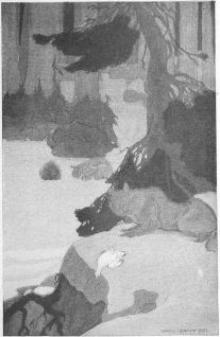 Love of Life
Love of Life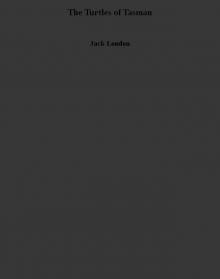 The Turtles of Tasman
The Turtles of Tasman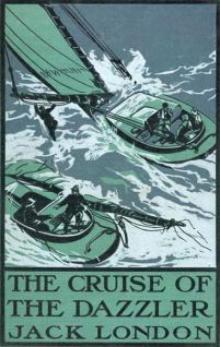 The Cruise of The Dazzler
The Cruise of The Dazzler The Heathen
The Heathen The Scab
The Scab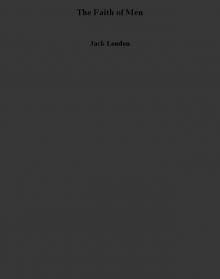 The Faith of Men
The Faith of Men Adventure
Adventure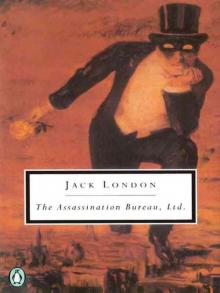 The Assassination Bureau, Ltd.
The Assassination Bureau, Ltd.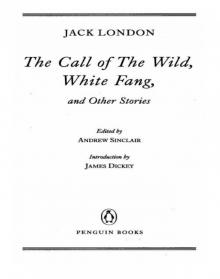 The Call of the Wild, White Fang, and Other Stories
The Call of the Wild, White Fang, and Other Stories The Call of the Wild and Selected Stories
The Call of the Wild and Selected Stories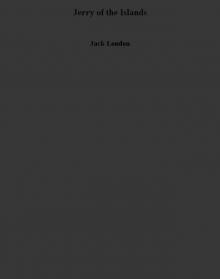 Jerry of the Islands
Jerry of the Islands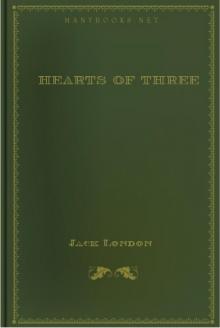 Hearts of Three
Hearts of Three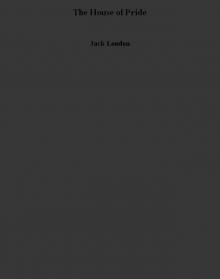 The House of Pride
The House of Pride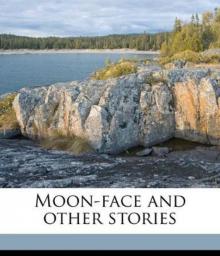 Moon-Face and Other Stories
Moon-Face and Other Stories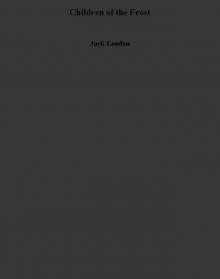 Children of the Frost
Children of the Frost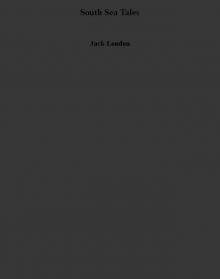 South Sea Tales
South Sea Tales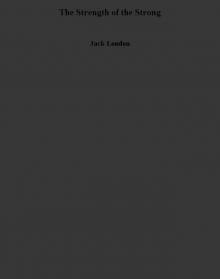 The Strength of the Strong
The Strength of the Strong The Jacket (The Star-Rover)
The Jacket (The Star-Rover)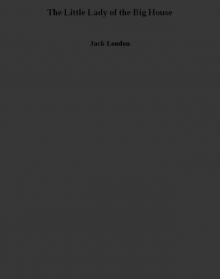 The Little Lady of the Big House
The Little Lady of the Big House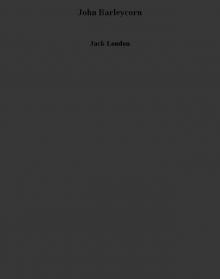 John Barleycorn
John Barleycorn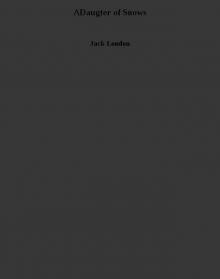 ADaugter of Snows
ADaugter of Snows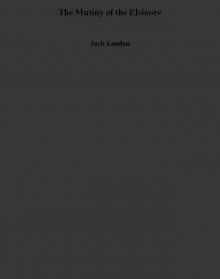 The Mutiny of the Elsinore
The Mutiny of the Elsinore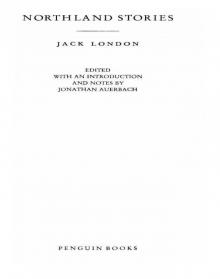 Northland Stories
Northland Stories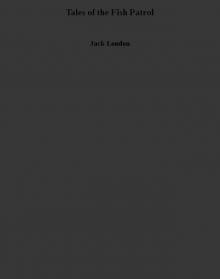 Tales of the Fish Patrol
Tales of the Fish Patrol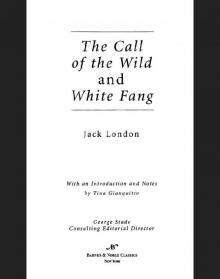 Call of the Wild and White Fang (Barnes & Noble Classics Series)
Call of the Wild and White Fang (Barnes & Noble Classics Series)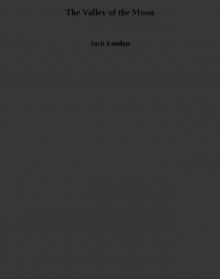 The Valley of the Moon
The Valley of the Moon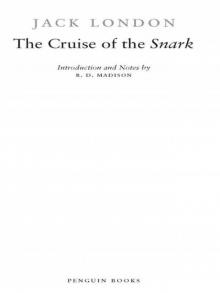 The Cruise of the Snark
The Cruise of the Snark The Game
The Game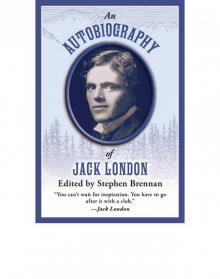 An Autobiography of Jack London
An Autobiography of Jack London